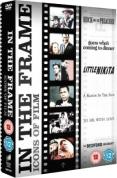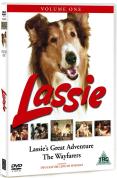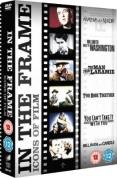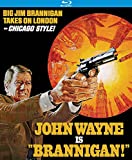![Halloween [1978]](/pictures/1020994.jpg) Halloween | DVD | (10/10/2005)
from £14.70
| Saving you £-8.71 (N/A%)
| RRP
Halloween | DVD | (10/10/2005)
from £14.70
| Saving you £-8.71 (N/A%)
| RRP It was a cold Halloween night in 1963 when six year old Michael Myers brutally murdered his 17-year-old sister. Fifteen years later he escapes from prison and returns home...
![Broken Blossoms [1919]](/pictures/1013234.jpg) Broken Blossoms | DVD | (16/10/2001)
from £26.98
| Saving you £-6.99 (N/A%)
| RRP
Broken Blossoms | DVD | (16/10/2001)
from £26.98
| Saving you £-6.99 (N/A%)
| RRP A Chinese man visits London in the hope that he can bring the message of Buddha to others. He falls in love with the daughter of a prize fighter and cares for her when she is beaten. Their friendship is to prove fateful... Silent with the original 1919 orchestral score by Louis F. Gottschalk.
 Halloween: The Complete Collection (Eight Disc Box Set) | DVD | (11/10/2004)
from £N/A
| Saving you £N/A (N/A%)
| RRP
Halloween: The Complete Collection (Eight Disc Box Set) | DVD | (11/10/2004)
from £N/A
| Saving you £N/A (N/A%)
| RRP A group of teens win a contest to spend a night in Michael Myers' childhood home to be broadcast live on the internet. But things go frightfully wrong and the game turns into a struggle to make it out of the house alive.
 Sidney Poitier - In The Frame Collection | DVD | (29/10/2007)
from £N/A
| Saving you £N/A (N/A%)
| RRP
Sidney Poitier - In The Frame Collection | DVD | (29/10/2007)
from £N/A
| Saving you £N/A (N/A%)
| RRP This box set features the following films: To Sir With Love (Dir. James Clavell) (1967): A novice teacher faces a class of rowdy undisciplined working-class teenagers in this classic film that reflected some of the problems and fears that existed among young people in the 1960's. Sidney Poitier gives one of his finest performances as Mark Thackeray an out-of-work engineer who turns to teaching in London's tough East End. Guess Who's Coming To Dinner (Dir. Stanley Kramer) (1967): Spencer Tracy and Katharine Hepburn are unforgettable as perplexed parents in this landmark movie about mixed marriage. Joanna (Katharine Houghton) the beautiful daughter of a crusading publisher Matthew Drayton (Tracy) and his patrician wife Christina (Hepburn) returns home with her new fiancee John Prentice (Sidney Poitier) a distinguished black doctor. Christina accepts her daughter's decision to marry John but Matthew is shocked by this interracial union; and the doctor's parents are equally dismayed. Raisin In The Sun (Dir. Daniel Petrie) (1961): The Younger family frustrated with living in their crowded Chicago apartment sees the arrival of a 000 insurance check as the answer to their prayers. Matriarch Lena Younger (Claudia McNeil) promptly puts a down payment on a house in an all-white suburban neighborhood. But the family is divided when Lena entrusts the balance of the money to her mercurial son Walter Lee (Poitier) against the wishes of her daughter (Diana Sands) and daughter-in-law (Ruby Dee). It takes the strength and integrity of this African-American family to battle against generations of prejudice to try to achieve their piece of the American Dream... Buck And The Preacher (Dir. Sidney Poitier) (1972): Buck (Poitier) an ex-Union Army Cavalry sergeant becomes a scout for freed slaves heading to the Colorado frontier. Tagging along with him are his wife (Ruby Dee) and a Bible-thumping con artist known as the Preacher (Belafonte). Attacked by racist bounty hunters determined to return the former slaves to a life of sharecropping in Louisiana Buck and his followers must summon all the courage they have in order to reach their destination and help settle the Wild West... Little Nikita (Dir. Richard Benjamin) (1988): Roy Parmenter is an FBI agent in San Diego; 20 years ago his partner was killed by a Soviet spy nicknamed Scuba still at large. Scuba is now trying to extort the Soviets; to prove he's serious he's killing their agents one by one including sleepers agents under deep cover awaiting orders. Roy interviews a high school lad Jeff Grant an applicant to the Air Force Academy. In a routine background check Roy discovers that Jeff's parents are sleepers. He must see if Jeff is also a spy confront the parents yet protect them and catch his nemesis. Bedford Incident (Dir. James B. Harris) (1965): Nerve-wracking suspense surrounds The Bedford Incident the tale of a U.S. naval vessel on a routine NATO patrol that ends up in a freakish showdown with a Russian submarine. Richard Widmark is Capt. Eric Finlander the maniacal commander who drives his tense crew to the brink of of nervous exhaustion. Sidney Poitier is Ben Munceford photojournalist aboard assigned to record a 'typical' mission. His moral indignation is put to the test by the captain's obsession with forcing the sub to the surface. Several crew members are at their breaking points as Finlander continues his prowl. Especially affected is a former German U-board commander now aboard the Bedford as a NATO observer portrayed by Eric Portman.
![The Dangerous Lives Of Altar Boys [2002]](/pictures/1018027.jpg) The Dangerous Lives Of Altar Boys | DVD | (28/06/2004)
from £19.23
| Saving you £0.76 (3.95%)
| RRP
The Dangerous Lives Of Altar Boys | DVD | (28/06/2004)
from £19.23
| Saving you £0.76 (3.95%)
| RRP After being caught drawing an obscene comic book a group of Catholic school friends plan a prank to make them local legends...
![Kannibal [2001]](/pictures/1022952.jpg) Kannibal | DVD | (08/10/2001)
from £N/A
| Saving you £N/A (N/A%)
| RRP
Kannibal | DVD | (08/10/2001)
from £N/A
| Saving you £N/A (N/A%)
| RRP Georgina Thereshkova (Linnea Quigley) is the beautiful head of a Mob crime family controlling drugs pornography and prostitution. The police are powerless to stop Georgina's criminal activities and to her family and rivals she appears all but untouchable. But a dark secret is catching up with Georgina which threatens to shatter the stability of her organisation. Quinn a figure from her past has arrived on her turf bent on revenge as he cuts a bloody swathe through Georgina's allies. Georgina's operation grows ever more vulnerable as the police investigation headed by Inspector Reed (Lucien Morgan) and Kavanagh (Steven Craine) starts to expose the full terrible nature of her crimes. KANNIBAL builds to shattering climax as the consequences of Georgina's past force a dramatic showdown between Georgina the police and the murderous Quinn.
![This Sporting Life [1963]](/pictures/1010951.jpg) This Sporting Life | DVD | (31/01/2000)
from £N/A
| Saving you £N/A (N/A%)
| RRP
This Sporting Life | DVD | (31/01/2000)
from £N/A
| Saving you £N/A (N/A%)
| RRP Prolific British filmmaker Lindsay Anderson weaves this small, evocative tale of young life at the crossroads in early 1960s Northern England. A rough, sullen young man (Richard Harris) working in the local coal mines begins to make a name for himself as a star rugby player, but even as he begins to fall in love he cannot escape the harsh realities of the bleak life around him. The rugby sequences in the film are striking, but no more so than the depiction of downtrodden people living in the shadow of industry and corruption that too often crushes their spirit. Harris in one of his first roles, is remarkably effective as an unlikeable but sympathetic figure trying against hope to savour the small joys life has to offer, and the film also features the debut of renowned actress Glenda Jackson. One of a series of working-class, character-driven British imports, This Sporting Life is one of the best on the field. --Robert Lane
 Lassie - Vol. 1 - Great Adventure / The Wayfarers | DVD | (03/04/2006)
from £5.79
| Saving you £4.20 (72.54%)
| RRP
Lassie - Vol. 1 - Great Adventure / The Wayfarers | DVD | (03/04/2006)
from £5.79
| Saving you £4.20 (72.54%)
| RRP Join Lassie the ever-faithful companion and her friends in their exciting adventures. The courageous canine will always be there in times of trouble and strife helping those in need. Lassie truly is everyone's best friend! Lassie's Great Adventure (Dir. William Beaudine 1965): Originally a three-part TV serial Great Adventure features the heroic pooch in fine fettle! While out with Timmy the heroic Border Collie is kidnapped and taken hundreds of miles away from
 James Stewart - Screen Legends - Westerns | DVD | (05/06/2006)
from £24.99
| Saving you £N/A (N/A%)
| RRP
James Stewart - Screen Legends - Westerns | DVD | (05/06/2006)
from £24.99
| Saving you £N/A (N/A%)
| RRP James Stewart was one of the great western icons and this collection houses several of his finest efforts. The Man From Laramie (Dir. Anthony Mann 1955): Will Lockhart comes to a small town to find the man who sold rifles to the Apaches and caused the death of his brother a cavalry officer. Beaten and nearly killed by cohorts of the arms dealer he also becomes embroiled with a ranch baron and his overwrought son. Father and son are plotted against by their treacherous for
![The Fairy Queen - Purcell [1995]](/pictures/1028658.jpg) The Fairy Queen - Purcell | DVD | (25/05/2001)
from £20.88
| Saving you £7.10 (39.69%)
| RRP
The Fairy Queen - Purcell | DVD | (25/05/2001)
from £20.88
| Saving you £7.10 (39.69%)
| RRP David Pountney and Quinny Sacks' production of Henry Purcell's The Fairy Queen caused something of a sensation when it hit the ENO stage in 1995. It has the feel of a decadent 17th-century masque re-invented with late-20th-century energy: half the principals and chorus are in cross-dressing costumes, female characters are played by men (leading to some rather wonderful polymorphous perversity), and everything has an air of mad, hallucinogenic hipness about it. While Robert Israel's wild sets don't appear to their full advantage on the small screen, Dunya Ramicova's costumes look fantastic (the details are simply stunning). The very fine singing is recorded with excellent clarity: while this is obviously a live performance, there are remarkably few moments that go out of microphone range, and the balance with the orchestra is handled very sensitively. The ENO band, under the baton of Nicholas Kok, respond to Purcell's wiry lines and spiky harmonies with glee, and sound like they're having a ball, as do the singers. In particular Jonathan Best as The Drunken Poet is hilarious, and it is a wonderful testament to his acting skills that he is as funny close-up as he was from the auditorium stalls.--Warwick Thompson
![Men in Black (25th Anniversary Steelbook) [Blu-ray]](/pictures/1160480.jpg) Men in Black (25th Anniversary Steelbook) | Blu Ray | (19/07/2022)
from £N/A
| Saving you £N/A (N/A%)
| RRP
Men in Black (25th Anniversary Steelbook) | Blu Ray | (19/07/2022)
from £N/A
| Saving you £N/A (N/A%)
| RRP ![Yellow Sky [DVD]](/pictures/1121973.jpg) Yellow Sky | DVD | (01/07/2013)
from £N/A
| Saving you £N/A (N/A%)
| RRP
Yellow Sky | DVD | (01/07/2013)
from £N/A
| Saving you £N/A (N/A%)
| RRP A band of outlaws led by tough gruff Stretch (Peck) find themselves knocking at death's door after becoming lost in the treacherous western Badlands - only to find their salvation in a lonesome town called Yellow Sky where the only inhabitants are a doddering old man and his mysterious alluring daughter. But their deliverance from danger is short-lived when the gang discovers a fateful secret hidden within the dusty rotting walls of this ghost town - one that will turn brother against brother in a desperate battle to the death! Special Features: Theatrical Trailer Poster Gallery Production Stills Gallery Behind the Scenes Gallery
 James Stewart - In The Frame Collection | DVD | (29/10/2007)
from £N/A
| Saving you £N/A (N/A%)
| RRP
James Stewart - In The Frame Collection | DVD | (29/10/2007)
from £N/A
| Saving you £N/A (N/A%)
| RRP This box set features the following films: You Can't Take It With You (Dir. Frank Capra) (1938): James Stewart Jean Arthur Lionel Barrymore and Edward Arnold star in this screwball comedy. Arthur stars as Alice Sycamore the stable family member of an offbeat clan of free spirits who falls for Stewart the down-to-earth son of a snooty wealthy family. Amidst a backdrop of confusion the two very different families rediscover the simple joys of life... Mr Smith Goes To Washington (Dir. Frank Capra) (1939): James Stewart Jean Arthur and Claude Rains star in this award-winning 1939 classic about an idealistic small-town politician who heads to Washington and suddenly finds himself single-handedly battling ruthless politicians out to destroy him. Man From Laramie (Dir. Anthony Mann) (1955): Will Lockhart comes to a small town to find the man who sold rifles to the Apaches and caused the death of his brother a cavalry officer. Beaten and nearly killed by cohorts of the arms dealer he also becomes embroiled with a ranch baron and his overwrought son. Father and son are plotted against by their treacherous foreman who wants the ranch for himself. Anatomy Of A Murder (Dir. Otto Preminger) (1959): A riveting courtroom drama of rape and premeditated murder is brought to life with an all-star cast in the suspenseful and highly-acclaimed Anatomy Of A Murder. Nominated for seven Academy Awards including Best Picture (1959) the film pits a humble small-town lawyer (James Stewart) against a hard-headed big-city prosecutor (George C. Scott). Emotions flare as a jealous army lieutenant (Ben Gazzara) pleads innocent to murdering the rapist of his seductive beautiful wife (Lee Remick). Produced and directed by the renowned Otto Preminger the film features a brilliant score by Duke Ellington. Packed with drama passion and intrigue Anatomy Of A Murder is a cinematic masterpiece that will keep you on the edge of your seat! Two Rode Together (Dir. John Ford) (1961): A group of children are held captive by the Indians. A Lieutenant enlists the help of a Texas Marshall in a rescue attempt. Based on the novel by Will Cook. Bell Book And Candle (Dir. Richard Quine) (1958): James Stewart is publisher Shep Henderson sucked into the underworld of Greenwich Village by the beautiful Gillian Holroyd (Kim Novak). Their liaison kicks off when Gillian employs her skills to indulge in a bit of fun. By the time Shep gets wise and rejects the artificial premise for a relationship she has sacrificed her powers to emotional awakening and all is set for a happy ending.
![Man In A Suitcase - Complete [1967]](/pictures/1010946.jpg) Man In A Suitcase - Complete | DVD | (29/08/2005)
from £N/A
| Saving you £N/A (N/A%)
| RRP
Man In A Suitcase - Complete | DVD | (29/08/2005)
from £N/A
| Saving you £N/A (N/A%)
| RRP Richard Bradford is ex-CIA agent 'Mac' McGill who now works as a private investigator. He goes from job to job living out hotel rooms with all his worldly possessions in one old brown suitcase... Featuring all the episodes ever made! Episodes comprise: 1. Brainwash 2. The Sitting Pigeon 3. Day of Execution 4. Variation on a Million Bucks (1) 5. Variation on a Million Bucks (2) 6. Man from the Dead 7. Sweet Sue 8. Essay in Evil 9. The Girl Who Never Was 10. All That Glitter
![D.W. Griffith - Monumental Epics [1915]](/pictures/1012781.jpg) D.W. Griffith - Monumental Epics | DVD | (24/06/2002)
from £N/A
| Saving you £N/A (N/A%)
| RRP
D.W. Griffith - Monumental Epics | DVD | (24/06/2002)
from £N/A
| Saving you £N/A (N/A%)
| RRP Theres little doubt that much of what we now take for granted about cinema owes much to the vision of director D W Griffith. Monumental Epics collects five of his most influential silent masterpieces. The Birth of a Nation (1915) is also the birth of the epic film. Made to commemorate the 50th anniversary of the end of the American Civil War this provocative film unflinchingly shows the humiliation of Southern culture, the "heroism" of the Ku Klux Klan, and links the Union and Confederacy by a common Aryan birthright. All of which has to be viewed in its period context if it is to be viewed at all. Intolerance (1916) is film-making of epic complexity. Human intolerance is related through a modern tale of wrongful conviction, intercut by three stories from Babylonian, Judean, and French history to point up the issue through the ages. The intricacy of the intercutting is breathtaking even now, but those as confused as the first audiences evidently were can opt to see each story separately. Sensitively tinted, this is Griffith's finest three hours. Broken Blossoms (1919) has Griffith venturing into domestic melodrama. Although there's a clear moral to be drawn from this tale of compassion in the face of ignorance and brutality, neither the over-acting of Lillian Gish and Donald Crisp, nor the vein of sentimentality that creeps into their characters' relationship allow the viewer to forget the period-piece nature of the film. Here an appropriately expressive musical score helps keep viewing at an attentive level. Way Down East (1920) shows Griffith moving from the epic to the personal, though still on a large scale. The combining of old-style melodrama with latter-day female emancipation is tellingly brought off, and Lillian Gish excels as the country girl used and abused by male society, until "rescued" by a farmer of true moral scruples. Unconvinced? Then go straight to the climactic snowstorm and ice floe sequences--Eisenstein et al are inconceivable without this as trailblazer. Abraham Lincoln (1930) marked Griffith's entry into the talkie era. Tautly directed, it offers a historically accurate account of the 16th US President's rise to power and his visionary outlook on American society. Civil War scenes are implied rather than enacted, and its Walter Huston's robust yet understated acting that carries the day, with sterling support from Una Merkel as Ann Rutledge and Hobart Bosworth as General Lee. On the DVD: Stylishly packaged, restoration and digital remastering has been carried out to Eureka's usual high standard, and the 4:3 aspect ratio has commendable clarity. Birth of a Nation has Joseph Carl Breil's original orchestral score and a pithy "making of" film by Russell Merritt. Intolerance contains a useful rolling commentary and a great wurlitzer soundtrack too. Way Down East includes a commentary. Abraham Lincoln also has a commentary, though Hugo Riesenfeld's score often verges on the mawkish. Overall this set is a must for anyone remotely interested in film as a living medium.--Richard Whitehouse
![Petulia [DVD] [1968]](/pictures/1092331.jpg) Petulia | DVD | (27/04/2009)
from £N/A
| Saving you £N/A (N/A%)
| RRP
Petulia | DVD | (27/04/2009)
from £N/A
| Saving you £N/A (N/A%)
| RRP Set during the swinging sixties in San Francisco Richard Lester's landmark romantic drama tells of the charmingly kooky socialite Petulia (Julie Christie) who has been recently married to David (Richard Chamberlain). Unhappy with her marriage she embarks on a love affair with a melancholy recently-divorced doctor (George C. Scott) as they try to make sense of their dispassionate lives. Through Nicolas Roeg's cinematography the non-linear fragmented love story loops back and forth and the dark reality emerges from the idyllic fa''ade of sixties opulence. As the story of Petulia's abuse at the hands of her husband unfolds the lovers try to find the courage to change the course of their lives in the face of their respective demons.
![Halloween [UMD Universal Media Disc]](/pictures/1034841.jpg) Halloween | UMD | (17/10/2005)
from £N/A
| Saving you £N/A (N/A%)
| RRP
Halloween | UMD | (17/10/2005)
from £N/A
| Saving you £N/A (N/A%)
| RRP Halloween is as pure and undiluted as its title. In the small town of Haddonfield, Illinois, a teenage baby sitter tries to survive a Halloween night of relentless terror, during which a knife-wielding maniac goes after the town's hormonally charged youths. Director John Carpenter takes this simple situation and orchestrates a superbly mounted symphony of horrors. It's a movie much scarier for its dark spaces and ominous camera movements than for its explicit bloodletting (which is actually minimal). Composed by Carpenter himself, the movie's freaky music sets the tone; and his script (cowritten with Debra Hill) is laced with references to other horror pictures, especially Psycho. The baby sitter is played by Jamie Lee Curtis, the real-life daughter of Psycho victim Janet Leigh; and the obsessed policeman played by Donald Pleasence is named Sam Loomis, after John Gavin's character in Psycho. In the end, though, Halloween stands on its own as an uncannily frightening experience--it's one of those movies that had audiences literally jumping out of their seats and shouting at the screen. ("No! Don't drop that knife!") Produced on a low budget, the picture turned a monster profit, and spawned many sequels, none of which approached the 1978 original. Curtis returned for two more instalments: 1981's dismal Halloween II, which picked up the story the day after the unfortunate events, and 1998's occasionally gripping Halloween H20, which proved the former baby sitter was still haunted after 20 years. --Robert Horton
 DVD/BLU-RAY - DEATHDREAM (AKA DEAD OF NIGHT) (LTD) (1 DVD) | Blu Ray | (28/11/2017)
from £N/A
| Saving you £N/A (N/A%)
| RRP
DVD/BLU-RAY - DEATHDREAM (AKA DEAD OF NIGHT) (LTD) (1 DVD) | Blu Ray | (28/11/2017)
from £N/A
| Saving you £N/A (N/A%)
| RRP  Brannigan Blu Ray | Blu Ray | (12/12/2017)
from £N/A
| Saving you £N/A (N/A%)
| RRP
Brannigan Blu Ray | Blu Ray | (12/12/2017)
from £N/A
| Saving you £N/A (N/A%)
| RRP ![Sands Of Iwo Jima [1950]](/pictures/1000530.jpg) Sands Of Iwo Jima | DVD | (19/08/2002)
from £22.96
| Saving you £-9.98 (N/A%)
| RRP
Sands Of Iwo Jima | DVD | (19/08/2002)
from £22.96
| Saving you £-9.98 (N/A%)
| RRP Blazing action and spectacle are on the menu as battle-toughened sergeant John M Stryker (John Wayne) prepares a group of soldiers for action in the Pacific. His training methods are harsh and the men dislike him especially new recruit Peter Conway (John Agar).Slowly however this dislike turns to respect especially when Stryker saves Conway's life. But the men have got their biggest test ahead on Iwo Jima where they have to inch their way up Mt. Suribachi under constant Japanese fire.One of John Wayne's finest performances it earned him his first Oscar nomination for Best Actor. Terrifying battle sequences and an excellent cast also earned three further Oscar nominations for Best Screenplay Best Editing and Best Sound Recording.

Please wait. Loading...
This site uses cookies.
More details in our privacy policy